- be_ixf; php_sdk; php_sdk_1.4.18
- 51 ms
- iy_2026; im_02; id_23; ih_13; imh_50; i_epoch:1.77188342829E+12
- ixf-compiler; ixf-compiler_1.0.0.0
- py_2025; pm_10; pd_08; ph_06; pmh_56; p_epoch:1.75993177781E+12
- link-block; link-block_link-block; bodystr
- pn_tstr:Wed Oct 08 06:56:17 PST 2025; pn_epoch:1.75993177781E+12
- 0 ms
- be_ixf; php_sdk; php_sdk_1.4.18
- https://sou.edu/academics/honoring-dr-edwin-battistella/
- https://sou.edu/academics/honoring-dr-edwin-battistella/
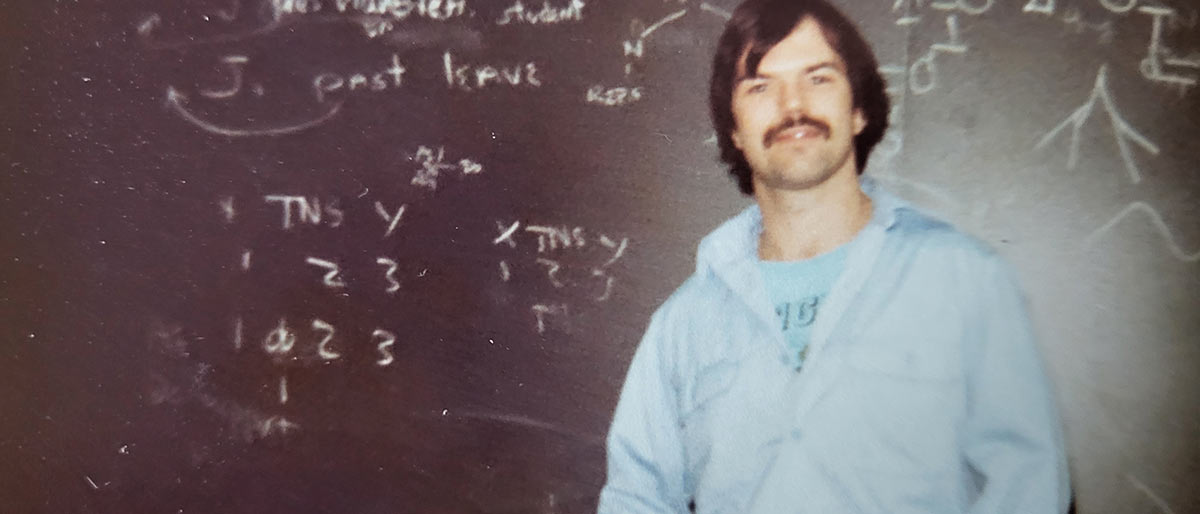
A Farewell to Dr. Edwin Battistella
Dr. Battistella’s Retirement from SOU
November 17, 2022
By Jewel Blanchard (she/her), Senior English Major.
Pictured above: Ed Battistella’s first year of teaching in 1982, at the University of Alabama in Birmingham.
Dr. Edwin Battistella has been a pillar of SOU Faculty, and the English department, for nearly twenty-two years. He is a familiar face for English majors and minors, Creative Writing students, and even those who generally frequent Taylor Hall (the building where he can often be found teaching). In preparation for his retirement at the end of the fall 2022 term, the English department as well as those who know and love Dr. Battistella have been recalling and celebrating his life, career, and accomplishments at SOU and the field of linguistics. And despite his humble tendency to downplay his successes, Ed–as he is known to colleagues and students alike–is also reflecting on all he has achieved and what he is looking forward to next.
Starting early on in his career, when asked where his fascination with language came from, Ed wishes he could say he “was bitten by a radioactive grammar book.” But instead, he admits that his interest began in fourth grade, when his teacher answered a grammar question by just shrugging and saying, “That’s the way it is.” This unanswered question somewhat dampened his interest in sentence diagramming, and as he puts it, “It made me sad.” Ed’s passion for linguistics also started young. As a kid growing up in New Jersey, Ed would visit his cousins in Pennsylvania and return home “using their vowels” in his speech. His New Jersey schoolmates would notice Ed slipping into this Pennsylvanian dialect and comment on it, though he didn’t know much about language variation at that time.
“I wish I could say I was bitten by a radioactive grammar book. But my origin story is more mundane.”
– Dr. Edwin Battistella
Ed went on to attend Rutgers College in New Jersey, graduating with a BA degree in Slavic Languages and Literatures in 1976. He describes the start of his undergraduate studies as “pretty planless,” choosing to study the Russian language after learning it in high school (which he took on in order to be able to read Russian chess magazines). Ed was the self-described “world’s worst Russian major” and felt out of depth studying alongside native speakers; he took a mix of smaller, more intense classes and bigger classes where he could “fade into the background.” At one point, Ed’s roommate convinced him to take an English grammar class their freshman year, which “hooked” him into minoring in linguistics.
As he honed his interests during his undergraduate years, Ed married his major and minor to study linguistic theories, especially those written by Russian authors Roman Jakobson and Nikolai Trubetzkoy. The timing was fortuitous, at a point in history when linguistics was becoming the central field of cultural studies and cognitive science, with plenty of graduate funding—developments Ed attributes to the work of American linguist Noam Chomsky. Ed found his way into graduate school at the City University of New York, completing a master’s degree in linguistics in 1979, and a PhD in linguistics in 1981. During that time, he wrote a dissertation “applying Chomsky’s theory of grammatical feature transfer to Czech grammar.” But this would only be the beginning of his scholarship.
“I was lucky to be in school at a time when government supported higher education as a public good. I wish those days were with us again.”
– Dr. Edwin Battistella
Ed held a few “odd jobs” throughout his time in college, like working in a sandwich shop where he “gave away more sandwiches than [he] sold,” and a job writing test-prep questions for Stanley Kaplan, where he argued with his boss over grammar conventions and rules (he still says that possessives are nouns, not adjectives, “BTW”). But only a couple of years after earning his PhD, Ed began his career in higher education at the University of Alabama in Birmingham (UAB), as the Director of the Linguistics Program, and later as an Associate Professor of English.
Though Ed recalls the journey becoming a professor as “harder than it looks,” with only so many hours in the day to get necessary work done, he recalls “reward[ing]” experiences along the way that helped soften the ever-present challenge of time. Ed spent time as a visiting teacher in China and the Czech Republic, as well as at the Linguistic Society of America Summer Institute. One especially memorable experience for Ed involved working at IBM during a 1990 sabbatical for Sylvia Plath’s brother, “who was a mathematician working on language projects.” Ed has also gotten to meet authors he admires throughout his career, like when he and a class of UAB Honors students dined with writer Harlan Ellison, and when he brought in playwright Bernard Kops to direct the world premier of his play Café Zeitgeist on campus at his next job in Nebraska.
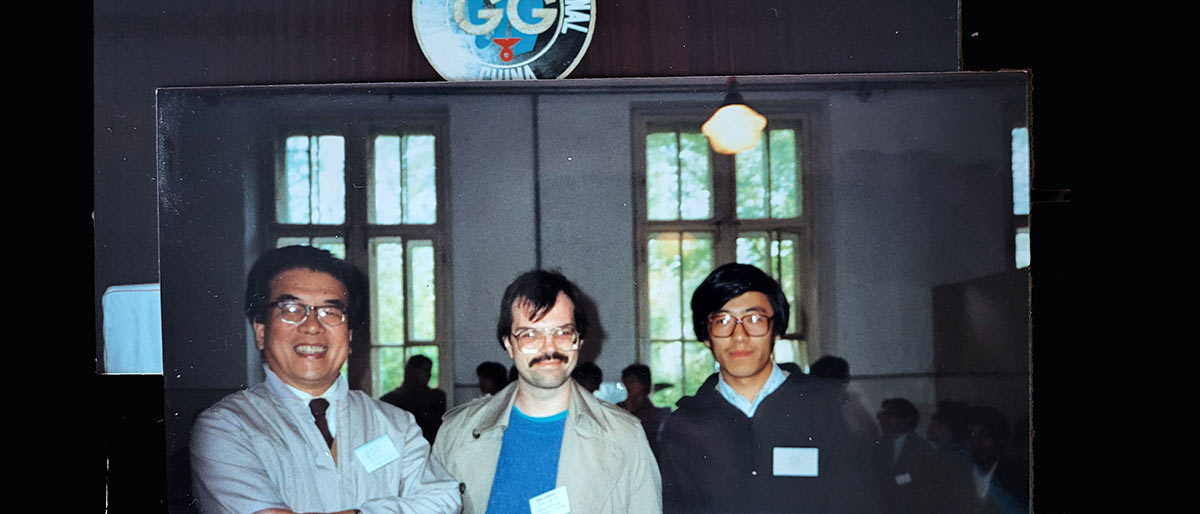
Pictured Above: Ed Battistella and some of his colleagues during his time teaching in China.
Ed’s research at UAB led up to his work at Nebraska’s Wayne State College, where he served as an Associate Professor, Professor of English, and Head of the Division of Humanities. Here, Ed focused his research on exploring the idea of markedness, which is built off of scholarship from Prague School and Chomskyan linguistics. For the uninitiated, markedness can simplistically be defined as the changing of a word to change its significance (for example, the change from “run” to “ran”). Ed’s scholarship resulted in two books: Markedness: The Evaluative Superstructure of Language (1990), and The Logic of Markedness (1996). These books were peer reviewed, and later led to Ed’s recognition as a Fellow of the Linguistic Society of America in 2013, “one of about 200 scholars with that distinction,” and an achievement he is especially proud of.
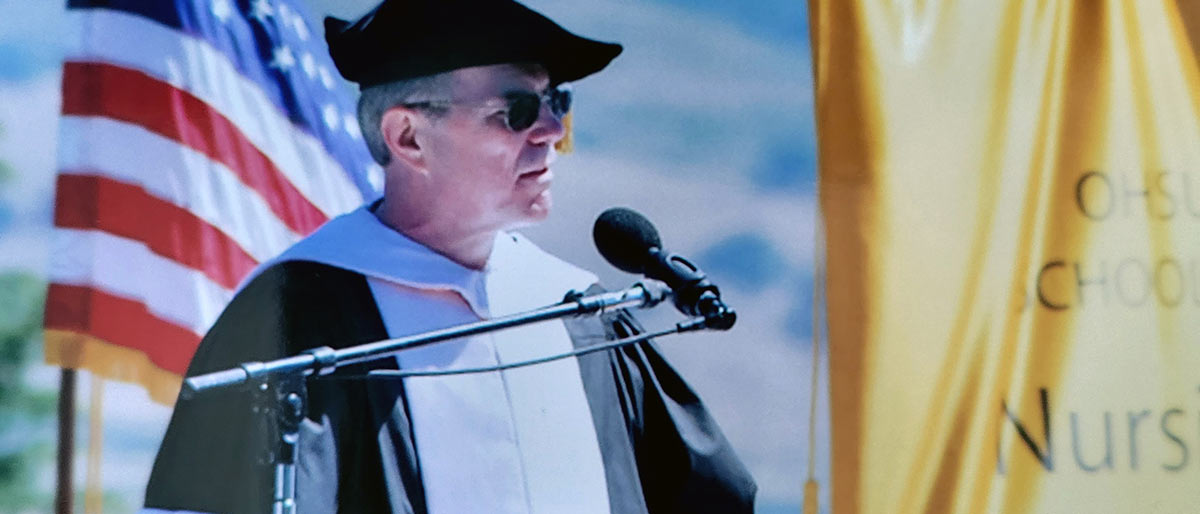
Pictured Above: Ed Batistella presiding at SOU’s 2008 Commencement.
In 2000, Ed moved from Nebraska to Ashland, Oregon, and began working at SOU as the Dean of the School of Arts & Letters. One of his current faculty colleagues, English Professor Dr. Alma Rosa Alvarez, recalls him as an administrator who was “thoroughly professional… a good listener, and a great problem-solver.” Ed had a brief stint as the Interim Vice President for Academic Affairs, and spent time as President of the Associated Professors of Southern Oregon University (the faculty union). Along the way, Ed served on various committees, task forces, and working groups. He says this involvement with university projects is a “good way to get to know people on campus,” and learn about the impressive work they are doing. Ed’s administrative work at SOU overlapped with being an English Professor, and he later wholly transitioned to that title, where he is today.
During this period of Ed’s career, he focused on a linguistic idea on his mind since his undergraduate days: language ideology. His research on this topic led to the authorship of two more books: Bad Language (2005), which looked at often-elitist attitudes surrounding “misguided views” of grammar, dialect, vulgarity, and more, as well as Do You Make These Mistakes in English? The Story of Sherwin Cody’s Famous School (2009), a “part-biography… and part history of self-improvement” centered around how education was marketed to class-climbers in the 20th century.
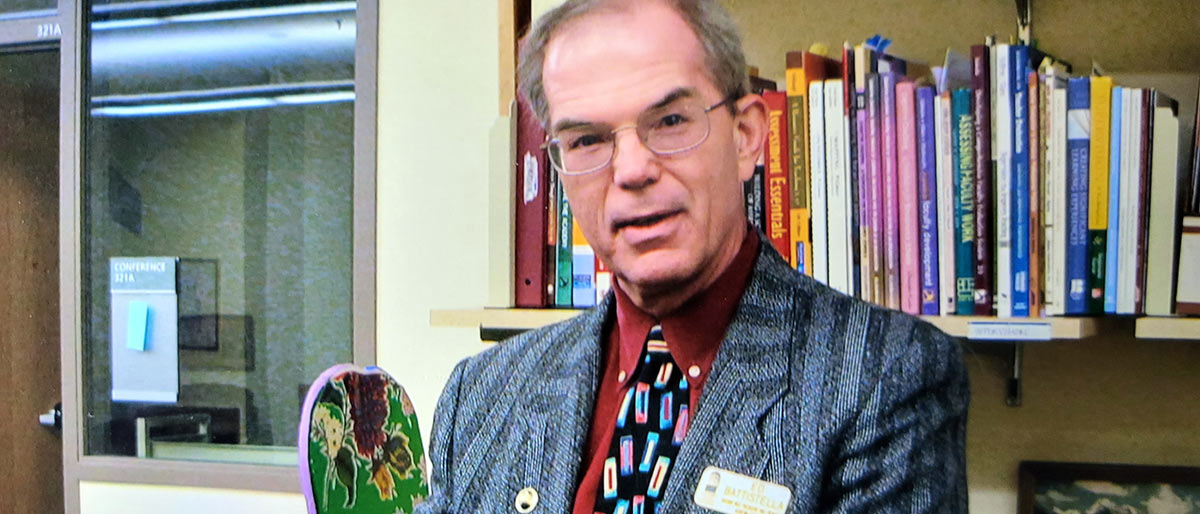
Pictured Above: Ed Batistella at SOU in 2008.
Yet perhaps his best-known book was written shortly afterward. It was inspired by a highly-publicized political stunt during President Obama’s State of the Union address, in which a congressman “shouted ‘YOU LIE,’ then proceeded to apologize, retract the apology, and use the episode as a fund-raising tool.” This moment inspired Ed to take a look at the cross section of language, history, politics, and sociology to examine noteworthy public apologies and reveal “how we [use words] to repair relationships or reputations.” The way Ed modestly puts it, the resulting book, Sorry About That: The Language of Public Apologies (2014), allowed him to “regularly comment on apologies in the news.” The way his colleague Dr. Merrilyne Lundahl puts it, “I claim bragging rights when Ed gets a spot on NPR or other news sites — ‘I work with him!'” Ed’s most recent title, Dangerous Crooked Scoundrels: Insulting the President, from Washington to Trump, was released in 2020 and—like Sorry About That—focuses on how we use words. But this time, Ed sought to take a look at how words are used to hurt others, specifically with how people have insulted U.S. presidents, and how they responded.
“When I came to SOU… I was already working on a different project: the ideology of language”
– Dr. Edwin Battistella
Ed’s scholarship and authorship of his books are far from the only writing experience he has had. He was the first book review editor for the Linguistic Society of America’s flagship journal Language, an Associate Editor, Co-Editor, and Editor of Blackwell Publishing’s Linguistic Abstracts digest, and the co-editor-in-chief of the Wiley journal Language and Linguistics Compass, where his editorial work focuses on the scholarship of integration. This vast knowledge of editing and publishing have made Ed a trusted advisor of many SOU English students interested in going into publishing, who inevitably take several of his classes as undergraduates. He has even shared his wisdom with colleagues, as Alma Rosa recalls his help mentoring her through the process of creating an index for her book, which she wryly calls “a publishing low.”
Ed has also written several notable articles throughout his career, including pieces for the Oregonian and other newspapers, the Oregon Humanities, and the Oregon Encyclopedia. This interest in the state he now calls home led to an extensive collaborative project Ed took on with colleagues at Western Washington University, leading to a co-authored piece in Northwest Voices: Language and Culture in the Pacific Northwest (published by Oregon State University Press), titled “Linguistic Diversity in Oregon and Washington.” Ed has written important and influential bibliographic essays for Choice magazine on the scholarship of integration, and for the Oxford Research Encyclopedia on scholar Nikolai Trubetzky. This led to an invitation to write a chapter for the Oxford History of Phonology on the Prague School, connecting back to his years of research on this topic during college years. Ed also writes a monthly column for Oxford University Press on grammar and language, some of which have been recorded as podcasts by Mignon Fogarty, aka “Grammar Girl.” He hopes to collect some of these short essays into a book on grammar one day.
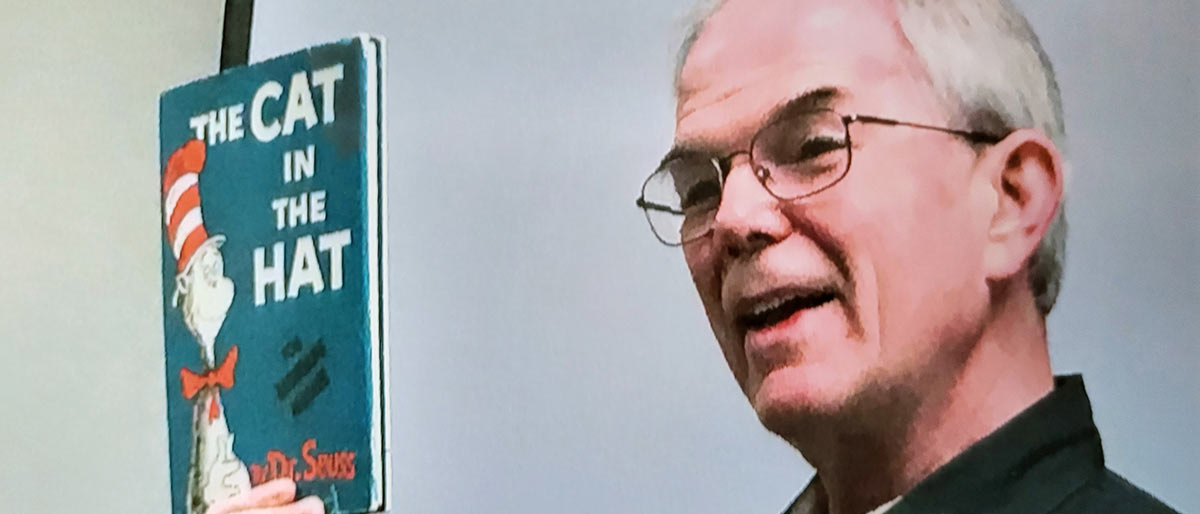
Pictured Above: Ed Batistella teaching “The Cat in the Hat” in 2017.
In 2020, Ed was nominated for Southern Oregon University’s Distinguished Scholarship Award, by his colleague and chair of the SOU English Program, Dr. Margaret Perrow. Her nomination letter highlighted the significant contributions Ed has made to the field of linguistics, including language markedness, syntax, linguistic diversity, and attitudes toward language. Margaret points not only to the impressive quantity of scholarship on Ed’s resume, but to the impeccable quality of that scholarship, leading to well-deserved international recognition and esteem. Moreover, Margaret highlights the “accessibility” of Ed’s scholarship—the way he makes it “relevant to a wide range of audiences.” One way Ed does this is by contributing to a variety of blogs, columns, and encyclopedia entries, as well as having written for Time magazine and even just Tweeting about linguistic concepts. He is clearly a scholar for the people, seen in his work and the connections he has made throughout his career.
“Ed Battistella is a consummate public intellectual whose work in applied linguistics reaches local, regional, national, and international audiences.”
– Dr. Margaret Perrow
Ed went on to win that Distinguished Scholarship Award in 2021 (an accomplishment he says he is particularly proud of), but it is far from the only highlight of his career. After all, Ed’s impact on colleagues and students over the years cannot be understated. Margaret notes that Ed “stands out” in modeling for students how to be curious, scholarly-minded, and engaged in class discussions, which forms them into better scholars. His colleague Merrilyne appreciates the accessibility of his work, which allows her and other educators to call upon his scholarship and integrate his articles, blog posts, and more into their own curriculum. And Alma Rosa mentions, in addition to all of the mentorship Ed provides to colleagues and students alike, how he is a creative thinker, “really funny,” and has a love for pun-making. She recalls one story from their years of working together in the English department. During an important meeting, Ed kept making puns to Alma Rosa while the speaker was talking. Despite struggling not to succumb to his jokes, she ended up laughing out loud and temporarily halting the meeting. But of course, Ed stayed “poker-faced” the whole time, and Alma Rosa had to create a new rule for herself: don’t sit next to Ed in meetings.
From a student perspective, it is clear to see how Ed’s teaching practice is directly influenced by his rich experiences with linguistics, authorship, research, publication, editing, and more. Ed says that he can’t pick one favorite from all the classes he’s taught over the years: “as with students, they are all my favorites.” At SOU alone, he has taught courses ranging from History of the English Language, to Technical Writing, to Rhetoric: Conspiracies and Cults. His goal, no matter which class he takes on, is to make linguistics and grammar both accessible and interesting, and to ensure classes are “oriented toward practical applications like grant-writing and technical writing rather than academic demonstrations.”
“I’m really proud to have had a part in helping students hone their skills and find their interests.”
– Dr. Edwin Battistella
Ed’s teaching approach (he doubts it’s deserving of the term philosophy) is based around three things: 1) When people have fun, they learn better, and people become life-long learners when they remember that learning is fun, 2) He remembers what was tricky or confusing to himself when he learned linguistics, and 3) It is important to keep in mind that students today have more complicated lives than they did when he was in school: in addition to completing college, they have to juggle debt, multiple jobs, personal challenges, and more. Another huge part of Ed’s teaching ideology is to build a network of colleagues and students with shared interests. To him, this is “one of the great pleasures of academic life.” Strangers might think it odd to observe Ed and a colleague debating the nuanced differences between phrases “good and hungry” and “good and angry” in an airport. But he insists this is simply how collaboration, exploring ideas, and sharing fascinations works: “When we explore odd things, we develop shared ways of researching and understanding and testing ideas that people can use all their lives.”
The themes seen in colleagues’ testimonies about Ed ring true within student experiences. Blake Jordan, senior English major, recalls how Ed brings a sense of “humor and playfulness” to the tricky field of linguistics, and that it is clear how his love of language impacts his teaching. SOU alum English major Levi Coren recalls Ed’s soft-spokenness and incredibly dry wit. He remembers how Ed would call upon his professional connections to bring guest speakers and experts into the classroom to pass along insight to students; these guest speakers often recommended students take as many of Ed’s classes as they could. Emily Perry, 2021 English major, loves the “comfort and personability” Ed brings to the English department, mentioning how he would always ensure everyone in class could participate in discussions, and stop and visit with students passing by on campus. She also remembers how Ed attended her private commencement last June when they couldn’t attend the real one. These different testimonies reveal how beloved and respected Ed is within his department, and the impact he has made on others.
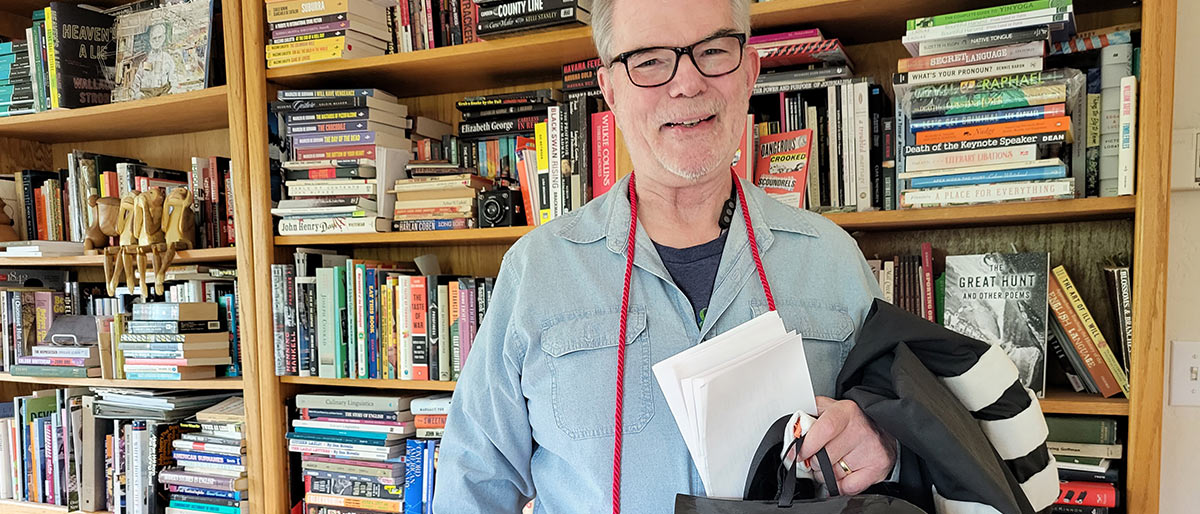
Pictured Above: Ed Batistella on the day of the Spring 2022 graduation ceremony.
All of these accomplishments, anecdotes, and memories add up to create a very clear picture of the scholar, professor, and person that Ed is. He is an example of how to follow your passions and interests in school, and how to fuse them together in scholarship to break new ground within your field. He has modeled and mentored the research, writing, and publishing processes for many, and produced an impressive and prestigious body of work that has been internationally recognized in the field of linguistics and beyond. Though he has worn several hats and taken on various responsibilities during his career, he has kept his interests and personal projects on the backburner and returned to them. The accessibility and consideration with which he teaches proves how driven he is to impart the complex linguistic concepts that he loves to his students. This is why he is so beloved within his classrooms, department, SOU, and the field of linguistics at large: Ed cares.
To aspiring authors, Ed imparts some tried-and-true advice that he himself practices: write every day. Ed does this in the mornings once he’s had his coffee, and says he tries not to get lost writing about tangents. But he admits he’s “not always successful in that last thing.” For current and future English students, he shares the following advice: “Find some ideas that fascinate you and pursue them. You’ll never be bored. And the ideas will grow with you.”
As Ed prepares to retire at the end of the fall 2022 term, he looks forward to the “endless summer break,” and hopes to travel, read, write, and continue his personal studies. Ed is currently working on another book tentatively called Lost Among Words: Misunderstanding as the Natural State of Language, about the cause of famous misunderstanding. For those interested in following his work, he will also continue writing for Literary Ashland, and Oxford University Press. Ed is considering taking a class or two in his retirement, and might even brush up on his rusty Russian skills. After all, he says he is a better learner today than ever before.
Interested in being featured on the English Program blog? Or know someone who is interested? Contact English Program blogger Jewel Blanchard at blanchardj@sou.edu.
Blogging for the English Program is another great way to expand your resume; it is a content-management and content-strategist position that exercises writing skills.
If you’re interested in building your content-management and content-strategist skills by blogging for the English Program next year, contact Margaret Perrow.
Learn more about SOU’s English Programs:
English Home Page | English BA/BS | English Minor | TESOL Certificate Program


